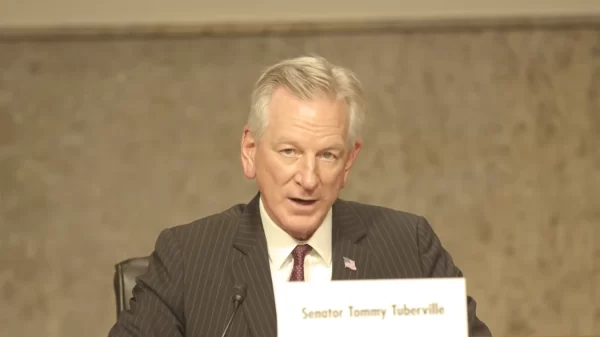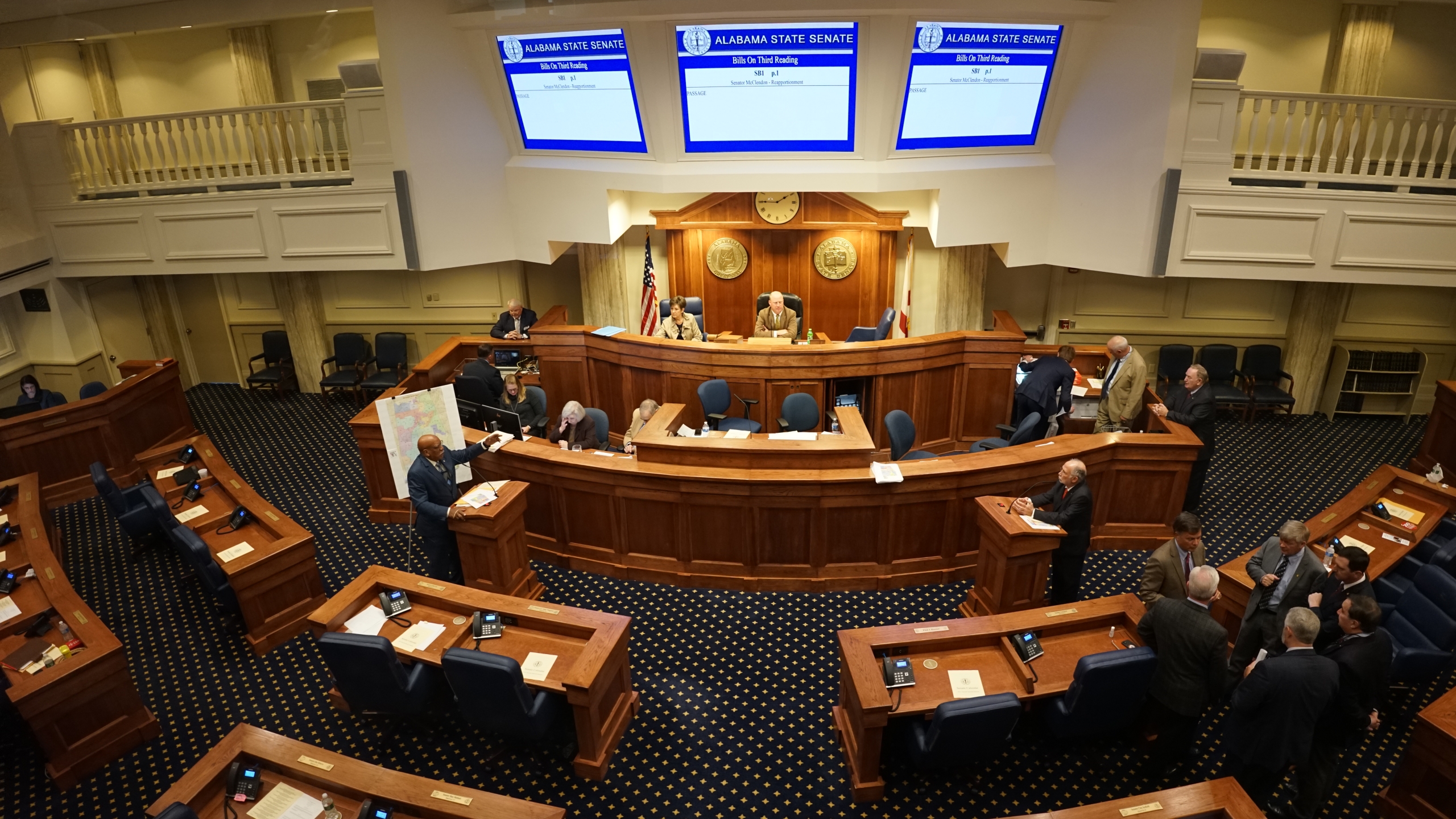After a long and confusing day of debate and backroom negotiations, the Alabama Legislature passed a bill on employee COVID-19 exemptions and ended its second special session of 2021.
The bill, sponsored by Sen. Chris Elliot, R-Fairhope, creates a form for employees to file claiming medical or religious exemptions to COVID-19 vaccines. It is expected to be signed into law by Gov. Kay Ivey as early as Friday afternoon, although a change to the bill gives 21 days for the administration to have the changes ready for implementation.
“There are people in the state that are hurting right now that are trying to decide between taking a vaccine that they are frightened of, that they have objections to for any number of reasons, and because of that they are in danger of losing their jobs due to federal mandates that are really unnecessary,” Elliot said after the bill’s final passage. “This Legislature felt like it needed to stand in the gap and provide some protection for employees while the courts take their time to look at this mandate and hopefully make the determination this is not something the federal government can do.”
Despite multiple amendments and substitutions to the bill throughout the day, the Business Council of Alabama continued its criticism of the bill.
A convoluted process
Lawmakers took a sometimes confusing path to approving the bill, alongside another COVID-19 vaccine bill sponsored by Sen. Arthur Orr, R-Decatur.
The House began its session at 10 a.m. Thursday, only to take an hour recess at 10:30 a.m. so the House Republican caucus could discuss the bills behind closed doors. Two hours later, Speaker of the House Mac McCutcheon, R-Monrovia, returned to the chamber, only to extend the recess for yet another hour, to the chagrin of Democratic lawmakers who were left to wait while Republicans continued their discussions.
With the process on pause, Chick-fil-A was brought out to legislators on the floor. In the House gallery, a protestor with Health Freedom Alabama knocked on the gallery glass, getting the attention of Rep. Jeremy Gray, D-Opelika.
“Get me HB9 or get me a chicken sandwich,” the protestor yelled down repeatedly, to laughter from members on the floor and security in the gallery.
Finally, around 2 p.m., the debate got underway on the floor.
First changes to the bill
The bill, which had passed the Senate Tuesday, now looked markedly different.
The medical exemptions had been fleshed out with more specific options for medical objections, including one exemption that would require a healthcare provider to sign off on the form.
The appeal process was also changed to begin with the employee instead of the employer. In the original bill, the employer was to file an appeal with an Alabama Department of Labor administrative law judge if they believed the employee should be terminated. The final version instead gives a terminated employee seven days to file an appeal.
The standard of proof remains simply a completed and submitted form, with little vetting in place. However, the bill did add language for disciplinary action for fraudulent claims, up to and including termination. The process for determining a fraudulent claim is still unclear given that the exemptions are presumed under the bill to be “liberally construed in favor of the employee.”
Lawmakers also added language that specifies that the bill should not be construed as taking away an employer’s right to terminate an employee for any other reason.
Democrats raise concerns
Democrats on the floor once again criticized the bill’s “blanket” coverage, and challenged the bill as being anti-business.
“This is the most anti-business piece of legislation I’ve encountered since my time in office,” said House Minority Leader Anthony Daniels, D-Huntsville. “I think this legislation is going to kill jobs in the state of Alabama. To support something like this that will kill jobs in Northern Alabama and all throughout state, then shame on you. There’s no way nobody in their right mind would support this legislation. I’m shocked you would bring something like this to the floor.”
Rep. Prince Chestnut, D-Selma, brought concerns about private actions being taken against employers due to the bill. Rep. Mike Jones, R-Andalusia, who carried the bill in the House, said he agreed with Chestnut and welcomed an amendment that Chestnut planned to bring back up.
Then, an hour-and-a-half into the debate, a cloture vote was brought forward and passed — only for McCutcheon to announce that the cloture had inadvertently come too early, ending the possibility of amending the substitute further on the floor.
The revelation caused a stir among both parties as everyone tried to understand what had just happened. Democrats were particularly upset, as Chestnut had just been told his amendment would be considered and could now not be recognized.
McCutcheon said the best he could do was pass the bill and to bring it to conference committee to have the amendments added in after the fact.
Final changes
Almost four hours after the House went into recess, the conference committee finally came forward with its final versions of the bill, which included the Chestnut amendment protecting employers from private action and also setting a sunset date on the bill of May 2023.
The bills finally passed both chambers of the Legislature shortly after 9 p.m.
By the time it was passed by the Senate, House Minority Leader Bobby Singleton, D-Greensboro, was the only Democrat left in the chamber to vote against the bill. The only other nay came from Sen. Larry Stutts, a Republican, who said the bill was an overreach.
Following the bill’s passage in the Senate, Sen. Tim Melson, R-Florence, came forward to give his thoughts, including that people should not be shamed for not getting the vaccine or for taking Ivermectin, citing the deeply personal reasons people make these health decisions.
Finally, the House put the bill through in its final form to conclude the session.
Orr’s bill
Sen. Arthur Orr, R-Decatur, also had a bill make it through the final day of special session, although Orr said the bill looked very different by the time it reached the finish line. The bill originally included language that gave the attorney general of Alabama capacity for injunctive relief in regards to the state’s vaccine passport ban.
However, that language was completely removed from the bill by the end of the night. Also removed from the bill was language narrowing the vaccine passport ban to apply only to COVID-19 vaccines. Protestors had raised concerns the language would allow pediatricians to resume discriminating against children who were not on the CDC’s vaccine schedule.
Lawmakers spent little time addressing these changes.
The bill as passed requires parental consent for minors to obtain COVID-19 vaccines and bars schools from inquiring about their vaccination status.




















































